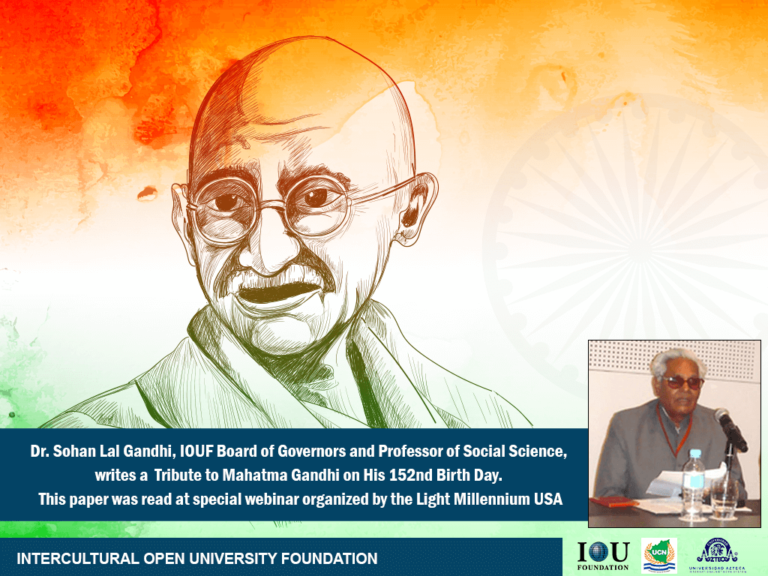(A Tribute to Gandhi on His 152nd Birth Day. This paper was read by our Board of Governors member and Professor of Social Science, Dr. Sohan Lal Gandhi at special webinar organized by the Light Millennium USA).
I consider Gandhi one of the greatest personalities who descended to this planet from time to time and radiated infinite moral courage and strength that helped mankind to rid itself of the gloom and moral filth in which it was mired. The millennium that preceded the birth of Jesus Christ was studded with resplendent spiritual stars like Mahavira, Buddha, Confucius, Plato Aristotle and a host of other enlightened souls. But in the entire span of the second millennium it was Gandhi who shone like the sun. The first millennium also had great leaders like Adi Shankaracharya and prophet Mohammed but they represented specific religions whereas Gandhi was a saint politician who stood for the unity of all religions and was thoroughly non-absolutist in his outlook and behavior. He was born as an ordinary person, a mediocre in studies and he faced all the odds and adversities which ordinary persons encounter in their journey of life and yet he rose to a position that even the most popular and successful persons of the world would envy. All his life he worked hard to perfect his spiritual qualities and the state of perfection he attained sometimes eludes even great yogis and recluses who spend years in meditation and solitary confinement but are unable to realize the self. The following lines from the introduction to Gandhi’s autobiography The Story of My Experiments with Truth, lend support to my conviction.
‘What I have been striving to achieve these thirty years is self realization, to see God face to face. All that I do by way of speaking and writing and all my ventures in the political field are directed to this same end.’
Gandhi was really a self-realized man who had seen God face to face. He saw Him in trees, bushes, mountains, rivers, marginalized poor persons, down-trodden and children who are being subjected to atrocities and are gradually perishing. To him nature was God and any onslaught on it was an affront to God himself.
Perhaps he was the only politician who strove to combine both politics and spirituality. As a politician his chief objective was social reform. His struggle for social reform turned into the struggle for independence. He regarded truth as God and was of the view that truth alone paves the way for man’s self-realization. He was never afraid of the adverse consequences one’s strict adherence to truth is likely to generate. abhaya was his real strength. At one place in his autobiography George Bernard Shaw, the most celebrated and eminent British litterateur of the twentieth century wrote, ‘all autobiographies are lies.’ He asserts that ninety nine percent of the events in the life of an individual are the same as those of others and only one percent of them might be different but most of the people who write their autobiographies desist from revealing these details which may tarnish their image. Gandhi’s autobiography as the title itself makes it clear stands apart. Gandhi makes no secret of his weaknesses and narrates every thing good or bad as it happened irrespective of its repercussions. His dharma was marked by truth and nonviolence. dharma to him was not a sect but righteousness or uprightness or morality in conduct. To say anything against the caste system or untouchability which was an integral part of our social system then and now and to which all stuck steadfastly required Himalayan courage. Gandhi denounced casteism and untouchability in unambiguous words and said they were a stigma for Hinduism. He faced the uproar and fury of the Hindu fanatics boldly and educated the masses against such superstitions. On the one hand he fought the mighty Britishers without arms, on the other hand he had to crusade against social evils such as untouchability and high or low status in society on the basis of a person’s birth in a particular caste. His crusade was a crusade against violation of human rights. His dharma was embedded in morality.
In the words of James Lovelock, an eminent scientist, who described the earth as Gaia – the ancient Greek goddess of the earth and said that the mother earth is critically ill on account of man’s invasion perpetrated by his ever-increasing greed. The environmental degradation which has caused the terrible crisis of sustainability and climate change is already at its nadir and we have begun to see its devastating impact.
Though Mahatma Gandhi didn’t use the word environment since the situation in those days was not so grim as we see today he was deeply disturbed by the ever-growing culture of consumerism, a direct byproduct of industrialization which began to harm nature during his time itself. He had visualized this situation even a hundred years ago and warned the humanity of the dire consequences if they didn’t restrain their activities. His book Hind Swaraj which was published in 1909 cautioned the people against unrestrained industrialization and materialistic pursuits. He didn’t want the people of India to imitate the west blindly and advocated a simple life based on physical exertion. He practised what he preached. He was of the view that ‘the earth has enough for our need but not enough for our greed.’ This is how Gandhi had foreseen the environmental catastrophe and opposed industrialization tooth and nail. Instead he pleaded for cottage industries, Gandhi’s views on environment consist of moral, spiritual and nonviolent dimensions. To him ahimsa and truth were the highest form of religion and development didn’t mean materialistic development. His concept of nonviolence encompassed all living beings and embodied the eternal values of life in his thought and actions. He said – ‘My ethics not only permits me to claim but requires me to own kinship with not merely the ape but the horse and the sheep, the lion and the leopard, the snake and the scorpion.’ He criticized the dehumanizing character of modern industrial civilization. Gandhi advocated voluntary simplicity. He disapproved of the concept of industrialized urban cities wherein material comforts and extensive use of machinery are most important. He also highlighted the importance of nature cure. Gandhi’s reverence for nature and his advocacy for using natural resources like water etc. frugally stems from his concept of unity of man which included all living beings. He appealed for respecting the five elements of nature – earth, water, ether, sunlight and air.
If the world had followed the path shown by Gandhi the earth’s carrying capacity would have been preserved and the problem of non-sustainability would not have surfaced at all. He was simplicity incarnate. He used scrapes of papers to write brief notes. Even when he bathed in Sabarmati River he consciously used minimum water. He was deeply concerned about the widening gap between the rich and the poor and wanted poverty to be eradicated. It was possible only when an individual takes his own share and doesn’t grab others share. His belief in ahimsa was total. He was influenced by Srimad Rajchandra Bhai, a Jain spiritual leader. Ahimsa was his environmental ethic. It alone can ensure our survival. Gandhi wanted both humans and non-humans to flourish. The environmental crisis is caused by man’s flourishing at the cost of non-humans i.e. trees, vegetation, rivers, birds and all animals.
Before the advent of Gandhi on the political scene of India nonviolence was discussed by the Jains or scholars of the Gita. It was a personal ethic but Gandhi lent a new dimension to the concept of ahimsa and he was instrumental in bringing it out of the confines of upasaras or places of discourses. He used ahimsa as a nonviolent political weapon to gain independence. He writes in detail in his autobiography how a Jain spiritual leader called Shrimad Rajchandra influenced his life deeply. On many occasions, he writes, “Raychandbhai was my guide and helper. Three moderns have left a deep impress on my life, and captivated me: Raychandbhai by his living contact, Tolstoy by his book ‘The Kingdom of God is Within You’, and Ruskin by his Unto this Last.” I believe that it was Raychandbhai who guided him as regards the subtleties of the principle of ahimsa. His ahimsa was an ethic which sublimates human state and creates a sense of fearlessness in its practiser. It is not a submission to cowardice but as a matter of fact it is an act of bravery. What surprises us all is that in an age when the means of communication were so slow, he could electrify the nation with the power of his moral strength. His use of postcards to communicate with the people in India was in fact the most effective marketing strategy.
His Dandi March was a device to galvanize the nation. When we analyze the historic march we wonder what led the Mahatma to organize a mass protest against a relatively insignificant issue of salt law since it could be opposed by mere statements. But hidden behind it was something more than meets the eye. Gandhi was a great psychologist and he had an indepth study of the Indian psyche. He knew that the salt was used by the rich and poor alike and it was the best way to rouse the people’s consciousness against the British presence in India. Gandhi’s Satyagraha is an innovative practice of ahimsa which he used dexterously to fight the British empire. He was no ordinary light.
I sum up my article by reproducing a paragraph from Nehru’s broadcast speech at the passing away of this great soul!
“The light has gone out,” Prime Minister Nehru continued in his broadcast to the Indian nation shortly after Gandhi’s death, “and yet I was wrong. For the light that shone in this country was no ordinary light. The light that has illumined this country for these many years will illumine this country for many more years, and a thousand years later that light will still be seen in this country, and the world will see it and it will give solace to innumerable hearts. For that light represented the living truth, and the eternal man was with us with his eternal truth, reminding us of the right path, drawing us from error, taking this ancient country to freedom.”
Although Gandhi’s commitment to morality in public life was total and his belief that a lasting peace could be achieved only by ahimsa was irrevocable, sometimes violence broke out. His fellow politicians too were impatient with him. Some wanted tougher actions and immediate results. It took him many years to prove the effectiveness of satyagraha through the breaking of the salt laws. But the communal violence that followed independence showed that the people of India had not really learnt the lesson in nonviolence.

